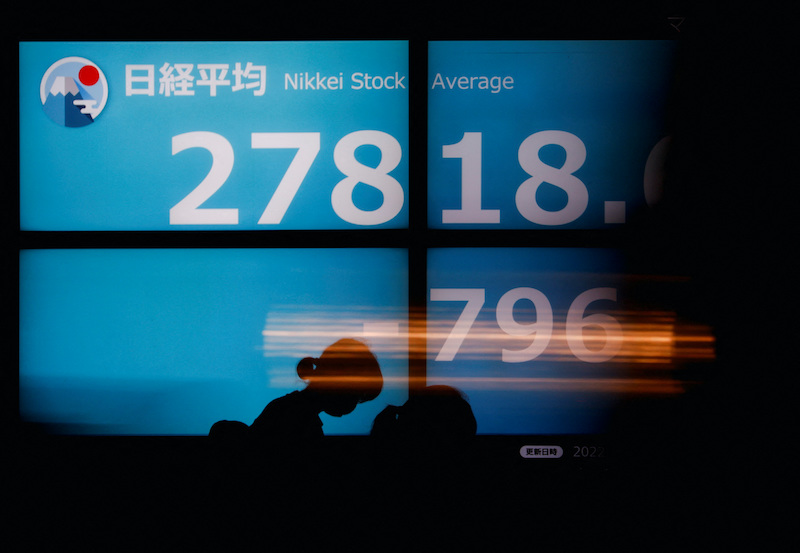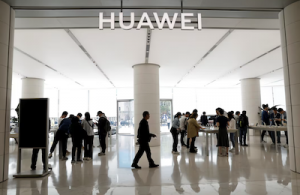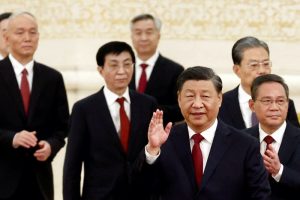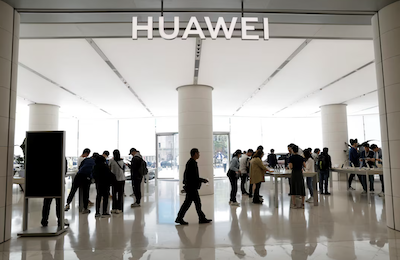Asia’s major share indexes presented a mixed picture on Monday with investors led by a weak Wall Street and poor China data on one hand, and hopes of a thaw in Sino-US tensions and more China stimulus on the other.
In a choppy beginning to the week, a surprisingly low reading on Chinese inflation highlighted the troubles in the world’s No2 economy, ahead of data on US inflation and corporate earnings due out later in the week.
Japan was the first to react to that New York uncertainty and the Nikkei share average slumped to a fifth straight losing session – its longest losing streak this year – and was also weighed down by a stronger yen.
The Nikkei slid 0.61% to close at 32,189.73, in a volatile session that saw the index rise as much as 0.53% in the morning and then drop in the afternoon. The broader Topix skidded 0.51% to 2,243.33.
Also on AF: Philippines Warns Beijing Over South China Sea Boats ‘Swarm’
The index has retreated 4.63% since closing at a 33-year peak of 33,753.33 a week earlier. The Nikkei had rallied 27% since mid-March to hit last week’s high.
Gloomy Chinese inflation data cut short a rebound in Hong Kong and China stocks, after investors had earlier taken heart from signs of a thaw in Sino-US relations, and a likely end to Beijing’s crackdown on internet firms.
Also, China’s factory gate prices fell at the fastest pace in over seven-and-a-half years in June, reflecting a loss of momentum in China’s post-pandemic economic recovery, and building the case for more stimulus measures.
The Shanghai Composite Index rose 0.22%, or 7.09 points, to 3,203.70, while the Shenzhen Composite Index on China’s second exchange edged up 0.32%, or 6.43 points, to 2,036.83.
Hong Kong’s Hang Seng Index rose as much as 2.3% but gave up most gains after the disappointing data dropped.
The Hang Seng Index gained 0.62%, or 114.02 points, to 18,479.72 after falling 2.9% last week to a one-month low.
Fintech stocks provided a bright spot amid the gloom, as investors reckoned a $984 million fine imposed on Ant Group, an Alibaba affiliate, meant a crackdown on the sector was drawing to an end.
Elsewhere across the region, in earlier trade, there were also gains in Sydney, Singapore, Seoul, Mumbai, Taipei, Manila and Jakarta. However, Wellington was in the red.
The gains in China helped MSCI’s broadest index of Asia-Pacific shares outside Japan firm 0.3%.
JPMorgan, PepsiCo Earnings Due
Eurostoxx 50 futures dipped 0.1% while FTSE futures held steady. S&P 500 futures and Nasdaq futures both dipped 0.2%, adding to last week’s losses.
Earnings season starts later this week with JPMorgan Chase, Citigroup, Wells Fargo, State Street and PepsiCo among the names reporting.
This week also has major data on US consumer prices which is forecast to show headline inflation slowed to its lowest level since early 2021 at 3.1%, down from 9.1% a year earlier.
Markets still think the Federal Reserve is likely to hike rates later this month but a weak CPI might lessen the risk of yet a further move in September.
Fed officials have been mostly hawkish in their communications, while markets have also priced in higher rates in Europe and the UK.
Bond Market Havoc
The risk of higher global rates for longer has caused havoc in bond markets, where US 10-year yields jumped 23 basis points last week, German yields 24 basis points and UK yields 26 basis points.
On Monday, US two-year yields stood at 4.95%, having hit a 16-year high of 5.12% last week.
The jump in developed-world yields caused ripples in currency markets, particularly in carry trades where investors borrow yen at super-low rates to invest in high-yielding emerging market currencies.
The net result was a rush to close yen short positions which saw the Japanese currency rally across the board last week, though it was struggling to sustain the surge.
The dollar edged back up to 142.46 yen, after sliding 1.3% on Friday, while the euro held at 156.18 yen. The single currency was also firm on the dollar at $1.0956.
Oil prices eased slightly, having touched nine-week highs last week as top exporters Saudi Arabia and Russia announced fresh output cuts. Brent fell 49 cents to $77.98 a barrel, while US crude lost 51 cents to $73.35.
Key figures
Tokyo – Nikkei 225 < DOWN 0.61% at 32,189.73 (close)
Hong Kong – Hang Seng Index > UP 0.62% at 18,479.72 (close)
Shanghai – Composite > UP 0.22% at 3,203.70 (close)
London – FTSE 100 > UP 0.12% at 7,265.67 (0933 GMT)
New York – Dow < DOWN 0.55% at 33,734.88 (Friday close)
- Reuters with additional editing by Sean O’Meara
Read more:
China’s Factory Prices Drop at Fastest in Seven Years, NBS Says
China Regulates $2.9tn Private Equity Funds for Economy, Tech
In Surprise Share Buyback, Ant Values Firm 75% Below IPO
























